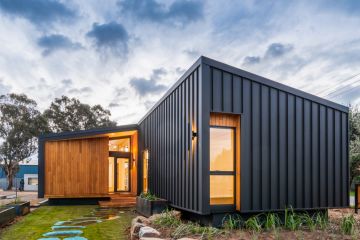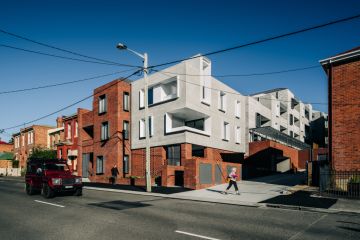The critical elements that everyone overlooks when looking for a property to renovate
Most aspiring renovators know to target a property with good bones, but it’s easy to focus too much on the obvious ways a home can be improved, such as updating surfaces and replacing the kitchen and bathroom.
What may be overlooked are the underlying aspects of the property that can affect whether it will be a viable project to renovate for profit.
1. Site access
While many people might assume stone benchtops, high-end appliances and exotic tiles eat up the bulk of a renovation budget, the man-hour component shouldn’t be underestimated, and complex projects that require more labour will inevitably cost more.
Properties with restricted access, such as inner-city apartments and terraces, townhouses and properties on a slope can also be more expensive to renovate, because working on a difficult site is slower and requires more hands on deck.
“It limits your ability to bring in machinery, and it often increases the need to have specialised equipment,” says professional renovator Naomi Findlay. “If you can’t use equipment and you have to use manpower, it can massively affect your costs.”
Flat blocks of land are easier to renovate on, according to buyer’s agent Amanda Bidder-Segers. “A builder is not going to be as keen to renovate on a huge hill.”
2. Regulations and precedents
To preserve the local character of an area and prevent overdevelopment and overcrowding, local councils place restrictions on what renovations are possible, and most substantial renovations will require council approval. Heritage features often must be maintained throughout a renovation.
Renovators may face challenges getting a major project approved if many surrounding properties haven’t also been extended, or if the building is intended to be larger than those it neighbours.
“If you can see that there’s a really big setback and no-one has a garage, you have to assume you’re going to have the same rules,” Ms Bidder-Segers said.
If neighbours have set a precedent with renovations, approval can be quicker, reducing holding costs and improving profits.
“Talk to a town planner or talk to council about what other houses have pushed the boundary on before, so you don’t go into a property thinking you’ll be able to set the precedent,” Ms Findlay said.
3. Natural light
Comparing two identical properties, one flooded with natural light and the other dark and gloomy, it’s likely the well-lit home would achieve a higher price.
“Everyone wants the Australian sun,” Ms Bidder-Segers said. “So if you have the wrong orientation, even with a renovation, it’s not going to help it.”
Windows and skylights can be installed, but can come at a substantial cost, and may affect the home in unexpected ways, according to Ms Bidder-Segers. “If you’re going to be putting in windows, you’re going to lose your privacy,” she said.
4. Storage and ‘bonus’ spaces
When examining a floorplan for a potential property, it’s tempting to fill every available square metre with habitable space and easy to overlook including storage in key areas, according to Ms Findlay.
“Everyone knows storage sells, but it sadly is one of the most overlooked things in a renovation,” she said. “It does add an amazing amount of value when you sell.”
Ms Bidder-Segers suggests buyers consider “hidden” storage in areas such as roof spaces, or even expanding existing storage areas into useable spaces.
“A lot of guys especially want to be able to get under the house, or have a shed out the back to have that man-space,” she said.
5. Neighbours
Properties in close proximity to neighbours can create challenges, as neighbours are entitled to register their opposition to nearby developments.
Unless you’re a contestant on The Block, apartment renovations will normally require permission from the body corporate, and for terraces and semis, neighbours may need to provide consent for works on adjoining walls.
It’s important to get neighbours on side from the beginning, according to Ms Findlay.
“Make them your friends up front, the minute the property becomes yours,” she said. “I like to make sure the neighbours know who I am, how they can contact me, and within reason, my relative intention with the property.”
“You want to be the person they call when there’s something they’re unhappy about, not council.”
We recommend
We thought you might like
States
Capital Cities
Capital Cities - Rentals
Popular Areas
Allhomes
More







